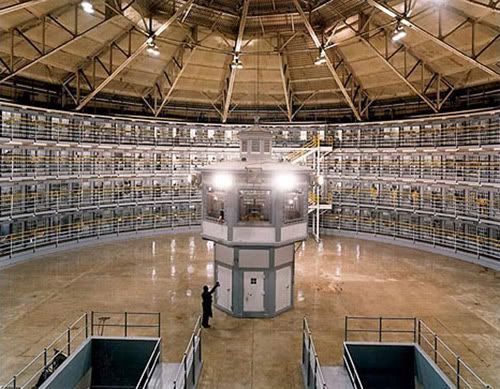Hotel U.S.A.
By Joseph Richey, AlterNet. Posted March 14, 2006.
The government's plans for an 'immigration emergency' include relocation and detention centers -- courtesy of Kellogg, Brown and Root.
Some time between now and 2010, the U.S. government expects some uninvited guests -- a massive influx of undocumented immigrants. In preparation for their arrival, the Department of Homeland Security (DHS) and Immigration and Customs Enforcement (ICE) backed the National Intelligence Reform and Terrorism Prevention Act of 2004, which mandates 40,000 new beds and barracks for foreign-born refugees at four undisclosed locations over the next five years.
On Jan. 3, 2006, the Army Corps of Engineers (USACE) expanded an existing contract held by Halliburton subsidiary Kellogg, Brown and Root (KBR) and renewed it to accommodate up to 20,000 refugees from environmental and political disasters. A future expansion in 2008 calls for another 20,000 beds.
Detention of immigrants and other undesirables without charge is nothing new. After the Civil War, many states supplied troops and police to assist private armed guards to arrest and detain striking workers. In 1918, Attorney General Mitchell Palmer and a youthful 24-year-old J. Edgar Hoover launched raids to round up and deport alleged subversives. In the fall of 1934, striking textile workers were interned in camps at Fort MacPherson outside Atlanta, Ga. Congress approved the Internal Security Act of 1950, including FBI Director Hoover's "Security Portfolio," a plan to arrest and detain up to 20,000 dissidents. 1984 Director of Federal Emergency Management Administration (FEMA) under Ronald Reagan reconstituted a readiness exercise, Operation Night Train, code-named REX 84, a potential roundup of up tens of thousands of Central Americans residing in the United States for internment in ten military detention centers.
But the difference here is that the emergency detention and removal plans for 2006-2010 are built on a new contingency support contract. Originally awarded in 1999 by the now-defunct Immigration and Naturalization Service, the contract sought logistical support for imagined immigration events. Contingency support contracts are good business for KBR, which provides insurance for calamities that don't happen.
http://www.alternet.org/story/33295/